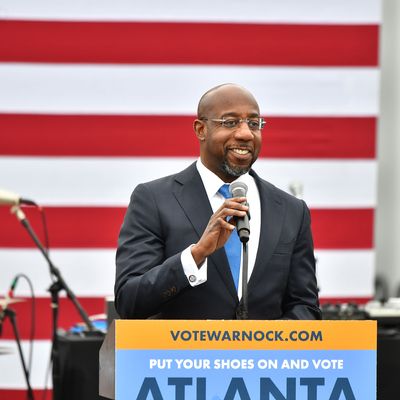
Of all the varied attacks on voting rights being undertaken by Georgia
Republicans in the wake of their bad performance in the 2020 elections, there’s one that smells so strongly of hypocrisy that it’s as though a giant deer-rendering plant had opened up in the parking lot of the State Capitol in Atlanta. That would be the effort (included in one major bill already passed by the House) to limit (or in an earlier version that could still be in play, even shut down) early in-person voting on Sundays. The legislation to that effect is very clearly aimed at Black churches in metropolitan counties that often conduct “souls to the polls” events encouraging worshipers to go vote after hearing the Word of God. As the Atlanta Journal-Constitution explains, restrictions on Sunday voting would most definitely have a disproportionate effect on Black Georgians:
The legislation targets Sunday voting, though there’s no suspicion of fraud or irregularities. The only disparity is that Sunday voting is offered primarily in heavily Democratic counties, where local governments were more willing to spend tax money to staff polling places on weekends.
Among many proposed voting measures in Georgia, restrictions on Sunday voting stand out for their racial and partisan impact. About 37% of voters on two Sundays in October were Black, higher than their 30% share of Georgia’s registered voters, according to state election data.
The attempted crackdown on Sunday voting is allegedly a matter of creating “uniformity” in voting opportunities, though only in a negative sense: All those less-metropolitan counties that don’t offer Sunday voting could do so if they wished. But what makes the gambit egregious is that it is the project of a political party that is otherwise devoted to turning churches into political dynamos so long as the GOP is the beneficiary.
One of Donald Trump’s top gestures of solidarity with the white conservative Evangelical churches that are his electorate base is his proposal to repeal the so-called Johnson Amendment, a law that threatens the tax-exempt status of nonprofit organizations (including religious organizations) that engage in electioneering activities, including endorsement of candidates. And as the Journal-Constitution reported in 2017, the Georgia GOP is a hotbed of support for getting rid of restrictions on politicized church activities:
Frustration with [the Johnson Amendment] has bubbled almost since it was adopted, particularly among some conservative Christian organizations. House Republicans, in a nod to their base, are making their most serious push in years to overturn it, tucking repeal language into the tax bill they passed last week.
“This is a simply free speech issue, one in which we can protect churches, temples and other places of worship from IRS intrusion as they exercise their right of religious freedom,” said U.S. Rep. Karen Handel, R-Roswell.
Handel was emphatically joined by the two ordained Southern Baptist ministers in the Georgia congressional delegation at the time: Jody Hice (a Trumpy conservative who is still in Congress) and Doug Collins (an unsuccessful right-wing Senate candidate in 2020 who may run for governor or the Senate in 2022). Another big proponent of the politicized pulpit has been Georgia-based Faith and Freedom Coalition president and sometimes GOP candidate Ralph Reed.
For the most part, Christian right leaders are more interested in telling their flocks how to vote than in ensuring they do vote; the latter is the emphasis of “souls to the polls” drives. But however you slice and dice it, selective support for separation of church and state (or church and politics) based on the partisan inclinations of the faithful is a very bad look, particularly when it has heavy racial undertones. One North Carolina GOP effort to proscribe Sunday early voting was struck down by a Fourth Circuit Court of Appeals panel in 2016 as overtly discriminatory, as the Washington Post reported at the time:
[T]he judges point to a “smoking gun” in North Carolina’s justification for the law, proving discriminatory intent. The state argued in court that “counties with Sunday voting in 2014 were disproportionately black” and “disproportionately Democratic,” and said it did away with Sunday voting as a result.
The ruling was later upheld by the U.S. Supreme Court, albeit on procedural grounds (the law in question also had other questionable features).
We probably won’t know until the end of March which combination of voter-suppression laws the Republican-controlled Georgia legislature will send to Republican Governor Brian Kemp to sign. If restrictions on Sunday voting are involved, it is to be profoundly hoped the pols involved don’t repair to the nearest conservative Evangelical church to brag about it, even as they claim Black voters should leave the Democratic Party to more properly reflect Gospel’s teachings.






























